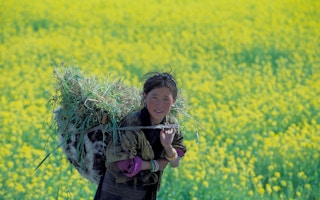Uyghur rights activists went to London’s High Court on Tuesday to challenge the British government for failing to halt imports of cotton goods made using “slave labour” in China’s Xinjiang region.
More than 80 per cent of China’s cotton comes from Xinjiang, where rights groups accuse Beijing of widespread abuses against Uyghurs, a mainly Muslim ethnic minority, including the mass use of forced labour in camps. Beijing vigorously denies any abuses.
A lawyer for the campaigners said it was “untenable” for Britain to allow the sale of cotton goods from Xinjiang made using forced labour, citing steps by the EU and the United States to crack down on imports of such goods.
“Our high streets are awash with cotton made using forced labour. That cotton is unwittingly being brought home by consumers who have no idea what they’re buying,” Siobhan Allen, senior lawyer at the Global Legal Action Network (GLAN) nonprofit, told Context outside the court.
Lawyers acting for Britain’s Home Office, the National Crime Agency and HM Revenue and Customs told the court there has to be a clear link between “the alleged criminality and its specific product” to investigate whether goods are made in a foreign prison.
China, which says the camps are designed to stamp out terrorism and provide vocational skills, has denied using Uyghurs for forced labour.
In their filing, GLAN and the World Uyghur Congress (WUC), an international organisation of exiled Uyghur groups, say imports of cotton goods made in Xinjiang should be considered “criminal property”.
At the end of the two-day hearing, the court will decide whether the government’s policy on imports is unlawful, and could potentially pave the way for the prosecution of companies that import cotton goods from the region, Allen said.
Pressure on China
The United States, which accuses China of genocide in Xinjiang, introduced a law in 2021 that broadly prohibits importing goods made with forced labour from the region.
Without naming any particular country, the European Commission in September proposed an EU ban on products made using forced labour with legislation that will add to the US pressure on China.
Jason Shepherd, whose team at risk management company Thomson Reuters Special Services - a US subsidiary of Thomson Reuters Corp - has analysed the efficacy of the US Uyghur Forced Labour Prevention Act, said it was difficult to untangle forced labour-made goods from supply chains.
Speaking ahead of his appearance at Trust Conference, an event organised by the Thomson Reuters Foundation, he added, however, that the US Act “raises the profile of the West’s concerns”.
The UN Human Rights Office said in a report last month that China’s “arbitrary and discriminatory detention” of Uyghurs and other Muslims in its Xinjiang region may constitute crimes against humanity.
Uyghur activist Rahima Mahmut, a member of the WUC who has lost contact with her family in China since 2017, said the organisation decided to take legal action when government policies remained unchanged after a campaign in 2020.
“The world is not doing enough to prevent this genocide,” she said. “If countries cannot do anything else - to stop torture, to stop sexual violence - at least they can stop slave labour goods from entering the country.”
This story was published with permission from Thomson Reuters Foundation, the charitable arm of Thomson Reuters, that covers humanitarian news, climate change, resilience, women’s rights, trafficking and property rights. Visit https://www.context.news/.










